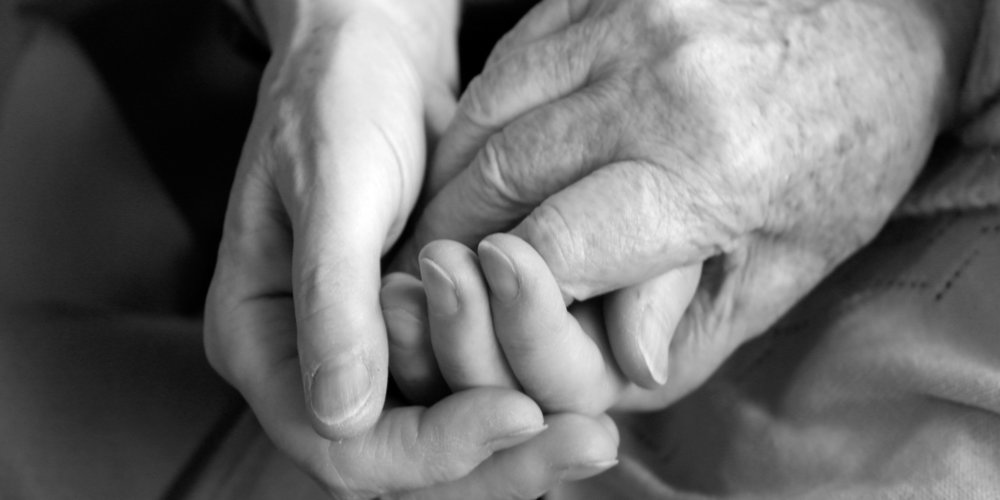
One of my best days lately was talking with a woman who cannot speak, listening to a woman who cannot hear, and dinner with a friend who said, “I only cry in front of you.”
___
For most of the past year, I’ve willingly moved toward sickness and death. Life recedes at every turn, among family, friends, and at work. There’s no shortage of pain, this we know.
___
When we visit a friend in the nursing home, my kind and compassionate husband can’t wait to leave.
Is it the smell, I ask? (They all smell, even the good ones. Because, well, incontinence stinks).
Is it the sight? Elderly people aren’t pretty. The beautifully elegant and aging Katherine Hepburn is like a unicorn, a myth. The rest of us sag, spot, wrinkle, shrivel, and smell.
No, he says, I just don’t know what to say or do.
Without action, he’s restless, wants to fix. I know the feeling, though I’m spared this anxiety because I rarely feel equipped to fix anything.
Still, what seems the most obvious action is also the most difficult: show up, without resolution, avoidance, distraction, or cheer.
___
use·ful
ˈyo͞osfəl/
adjective
1 : capable of being put to use; especially : serviceable for an end or purpose <useful tools>
2 : of a valuable or productive kind <do something useful with your life>
My every prayer: make me useful.
___
Years ago, I began working with teens in a writing group. Many of the young writers struggled through lives complicated by abuse, neglect, drugs, alcohol, and more. I had no experience in social work or teaching. Even writing was more instinct than education.
Expressing my anxiousness, a good friend offered the best advice: Just show up. Be present.
She was right. The teens have now grown up and on, and I still whisper those five words to myself.
I’m not an expert in health care, psychology, or, really, anything. At the nursing home where I work, I sometimes turn into a strange version of myself. My voice rises in a cheery rush, an effort to fill the uncomfortable space. But I’m trying. Some days I visit with a woman who talks in gibberish. We don’t need words. We sit in the sun. I hold her hand, and she smiles.
I’m trying to be quiet, to sit still, to be.
___
What I’m learning is the span between sickness and death is a long, gray, murky mess. The definitive moments are few. You do this and this and that, in a zigzag, with no direct route. Sickness is cloudy and slow.
Few of us die suddenly, peacefully, easily. It’s not death that unsettles me, but the rocky road to get there.
___
We should write about this, my friend says.
She's in the mire of caregiving, watchful of every change in a disease robbing body and mind. This is not the life she imagined. Together, each in our own way, we’re seeing many ends.
But what would we say? Illness is ugly. Aging stinks. We don’t want to see the unpleasant end. And when we squirm with discomfort, we don’t want to realize that we’re not as magnanimous as we believed.
___
You can brighten a life, I tell a prospective volunteer. But not many people want to visit the darkness of dying, even if a visit would light up the lonely.
It takes so little to help another. This is a fact both comforting and sad.
___
At the nursing home, or in the hospital, time slows and I’m in a protected envelope in which every moment matters. Most days I feel lucky to be among people who trust me enough to let me see their fear and loneliness. I’m trying to say that every small gesture is worthy of effort. And those gestures are largely unseen, and that seems the most honest and true thing I can do.
___
But let’s not get dramatic; I’m holding a hand, not curing cancer. I’m admiring a necklace, and noticing new socks. I’m discussing the chicken dinner, and gushing over a fresh manicure. I’m pushing a wheelchair, not because she can’t push herself but because it gives me an excuse to chat and smile, to be of use.
___
I didn't expect to laugh so much. But I'm giggling with Betsy, who is telling me about her absent children and no-good man. And I'm laughing with Sylvia, who is sneaking a smoke. And I'm silly with Ellen as we bumble to secure her jacket that is all zippers and sleeves.
"I'm no good at this," I mutter.
"You're learning," she says, patient as Sunday.
We laugh at our mutual inability. We are giddy about nothing at all, and in nothingness we share an everyday ease.
___
Happiness doesn’t come in the way I expected, writes Samantha Harvey, not a massing of good things over time, but a succession of small, strange and unowned moments.
___
Unexpectedly, gratitude gathers. My thankfulness is a messy pile of autumn leaves. In this decay, there is much beauty.
